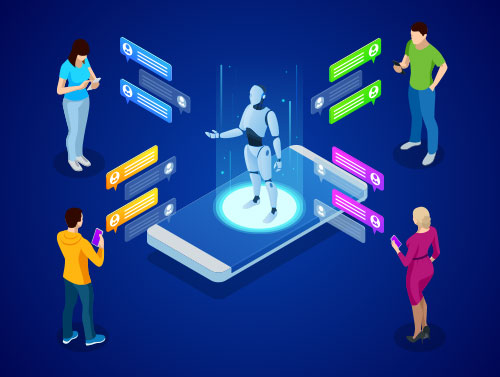Artificial intelligence (AI) has become an integral part of many industries, including marketing. In numerous conducts, AI is already swaying the digital marketing industry, and content marketing is no exception. There is plenty more to come in the future. You can expect numerous AI-based alterations and improvements in the online marketing industry.
How Artificial Intelligence in Marketing helps to improve UX?
In 2017, Toyota offered an insight into Concept-I – their version of the future where astonishingly, driving a car is still enjoyable. In Toyota’s case, it’s amusing because they’re cruising alongside Yui – an AI personality that assists them in navigation and communication.
Yui controls every function of the car and even takes charge of the steering wheel when the need arises. It’s certainly an exhilarating future where a machine comes close to becoming a human and exhibits empathetic behavior. That’s the kind of future we all envision.
So far, to advance user engagement, numerous UX teams have turned to metrics and tools like usability tests, A/B testing, heat maps, and usage data. Nevertheless, AI can collect more data, and AI will soon eclipse these approaches in marketing. It can assist in connecting with the residents of the world while providing them more control over operations.
At present, UX hinges on an interface. It involves screens, for instance. When humans will connect with AI concepts so profoundly that there will be no need of an interface. Certainly, the integration of AI in marketing processes will result in better UX across all industries. It’s not a matter of how, but when.
What is Artificial Intelligence in marketing, and what makes it so powerful?
Artificial intelligence in marketing or modern-day AI marketing is an excellent medium to leverage customer’s data. AI concepts can help you anticipate your customers’ next move and enhance their buyer’s journey. Day after day, more companies are shifting towards AI marketing for obvious reasons such as:
- More scalability
- Automation
- Saves time and money
- Efficient results
- Less manual labor required

Examples of Artificial Intelligence in Marketing?
Predictive Targeting of Ads
AI in marketing has made predictive targeting of advertisement more proficient. When applied to programmatic advertising, artificial intelligence in marketing can standardize things like the best time of the day to run an ad or the probability of an impression converting into a sale.
Digital marketers must target increasingly granular segments and reach out to their customers with a level of personalization. They can use AI to achieve this. With the data that marketers already have about their customers, they can train AI algorithms to identify significant variables.
For instance, if a teenager searches for a present for an older relative, dynamic segmentation will place them in the segment most suitable to their current purchasing behavior. By using real-time data, businesses can present relevant offers and avoid using obsolete data for targeting.
Predictive Analysis of Sales
Moreover, the predictive analysis of sales is another prediction-based AI tactic. With the previous sales data, AI can make industry-wide comparisons and economic trends to forecast the outcome of your sales. It can help in making informed decisions at crucial times and help predict short or long-term consequences.
AI in sales can help estimate the demand for any product. Although you must be careful when you take other factors into account. For instance, an organization undergoing production issues may only sell a specific number of units due to a lack of merchandise, not due to the lack of that product’s demand. By and large, by only using sales figures to forecast the market for any product would lead you to imprecise predictions.
Chat Bots
Over the past few years, the use of chatbots has risen dramatically, and several companies are still successfully using them to scale their businesses. Deborah Kay – an AI marketing expert spoke about the popularity of Singapore’s “Bus Uncle” chat platform at a recent Econsultancy Digital Outlook event.
It uses Facebook Messenger to provide info on the schedule of buses. Moreover, various brands have initiated building conversational voice experiences and voice-enabled devices, which will act as the future of customer interaction.
Accomplishing Marketing Targets with AI
Marketing strategy in AI
Once you comprehend the significance of using AI in your marketing strategies, it’s also essential to assess your existing marketing strategies and identify the extent that can enhance by implementing AI. For example, you can:
- Optimize current ads – Existing ads are a great place, to begin with. Once you’ve implemented AI and allowed your machine to learn from your existing customer database, you can start creating smarter ads that can speak to the customers.
- Predict customer’s buying behavior – By analyzing the past behavior of potential customers, AI in marketing can help you calculate what products any customer is likely to buy. It assists you in providing personalized products to your customers.
- Adopt incentives instead of mass offerings – While using AI in marketing, you can examine the purchase and engagement behavior of your customers to identify what type of incentives drive them to buy the product. Some may need a 30% off before they convert, whereas others will settle with free shipping only.
Executing Marketing Strategy through AI
In simple terms, a good business strategy will be different from the competitors’. However, your AI strategy can be identical. Your customer data varies from theirs, and henceforth, so will your results.
You can begin with the following simple five-step process:
- Defining the Strategy: Identify what you want to accomplish through AI, and how do you plan to implement the strategy?
- Train and Recruit: This phase involves onboarding a team who can help make your vision a reality. At the same time, they must train your existing team to benefit from the new system.
- Operationalize: Prepare to introduce your AI-based strategies by allowing them to be a part of business operations. Needless to mention, ensure everything is in place before you go live.
- Deploy: This is the phase where your AI-based tactics are live. This is where all your hard work begins to pay off and deliver results.
- Optimization: One of the primary benefits of using artificial intelligence in marketing is that it can provide analytics that can help you further improve your business operations.
Top 5 AI Marketing Tools
AI technology powers many online tools that we use today, that too without realizing. The list of such tools continues to grow. Some of my favorites tools are:
- Grammarly – It’s an AI-based content proofreading tool. It won’t wholly rectify your writing errors. Nonetheless, it’s a powerful software, and its integration with apps or browsers is very convenient and allows you to become a better writer over time.
- Import.io – It lets you import data from any web page. You can compile the data into spreadsheets or visualizations as per your convenience.
- Cogito – It’s a real-time conversation analysis and guidance system. It can detect signals in your customers’ speech and predict an appropriate reaction that your sales or support team should provide.
- Sensai – An AI social media marketing insights and recommendations platform that examines the efficacy of your social media posts, and guides you towards forming a strategy to hit bigger targets. This mobile-app puts a social media expert in your pocket.
- Cortex – It improves your email subject lines and identifies the best time to send emails. You can track user responses and then use the data to build engaging campaigns.
The Future of Artificial Intelligence in Marketing
According to the research by the “State of Marketing,” there are some obstructions in executing artificial intelligence in marketing strategies. The three significant barriers are financial limitations, customer privacy apprehensions, and lack of internal skill set. Regardless, businesses
have recently started to uncover the potential of AI marketing.
In another survey from 2017, 79% of organizations stated that they don’t extensively use AI across the company.
Customers expect any brand to understand what they need before they agree on taking the plunge. They want tips, suggestions, assistance, and answers in real-time. It isn’t going to change any time soon; it’s only going to increase over time.
Artificial Intelligence is an effective way for organizations to keep up with the ever-growing customer expectations. Nonetheless, it’s safe to say that artificial intelligence is the future of the marketing industry. Without any limitations, you can conveniently bring human experiences closer to the latest technology and its many benefits.


















